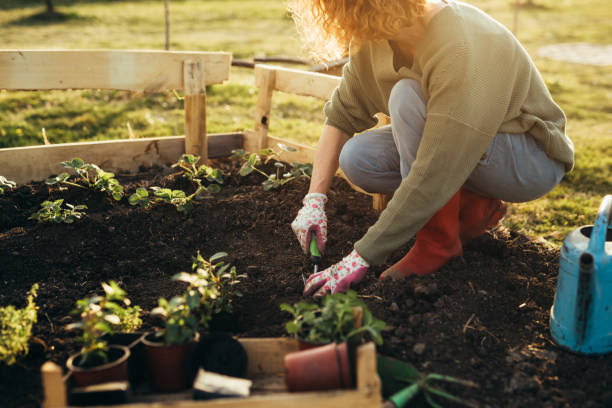Transitioning your home to 100% Organic Products is an excellent step toward a healthier lifestyle and a significant move toward creating a more sustainable environment. Organic products, such as food, cleaning supplies, and personal care items, are free from harmful chemicals, synthetic additives, and genetically modified organisms (GMOs). This shift, in turn, can contribute to improved well-being for your family and, consequently, a reduced ecological footprint. However, the transition requires careful planning, research, and commitment to ensure that all aspects of your household align with organic principles.

Why Choose 100% Organic Products for Your Home
By transitioning to 100% Organic Products, you have a healthier lifestyle and contribute to environmental sustainability. They contain fewer harmful chemicals, thereby promoting sustainability, while also reducing environmental impact, and enhancing indoor air quality.
Start with Organic Food Choices
Begin your transition by replacing conventional food items with organic alternatives whenever choose organic fruits, vegetables, dairy, and grains. To ensure quality, therefore, look for certified organic labels.

Use Organic Cleaning Products
Conventional cleaning products, however, contain toxic chemicals; therefore, switching to organic cleaners made from plant-based ingredients. They are safe for both your family and pets.
Choose Organic Personal Care Items
Replace personal care items such as shampoos, soaps, and lotions with organic options. They are free from artificial fragrances and therefore do not contain harmful additives.

Invest in Organic Bedding and Clothing
Opt for organic cotton bedding and clothing. They are free from synthetic dyes and pesticides, thereby providing both comfort and sustainability.
Switch to Organic Gardening Practices
If you have a garden, use organic fertilizers and pesticides. They support soil health while also promoting biodiversity.

Opt for Organic Home Furnishings
Choose furniture made from organic materials, such as bamboo, wool, or natural latex because these options are sustainable and Eco-Friendly. Avoid synthetic materials that may release harmful toxins.
Buy 100% Organic Products for Baby
For families with infants, consider organic baby products such as diapers, clothing, and skincare. They help protect sensitive skin from harsh chemicals; moreover, they provide a gentle barrier against irritation.

Evaluate Your Home Environment
Assess your home for sources of potential toxins. Subsequently, gradually, replace non-organic products with organic alternatives.
Shop from Trusted Organic Brands
Therefore, look for reputable organic brands that, in addition, adhere to sustainable and ethical production practices. Research certifications such as USDA Organic and EcoCert.

Benefits of Using 100% Organic Products
Switching to 100% Organic Products offers numerous advantages:
- Healthier Lifestyle: Organic items, therefore, are free from harmful chemicals such as pesticides and synthetic additives.
- Environmental Impact: Organic farming reduces pollution and conserves resources.
- Better Quality: Organic products, in addition to offering better durability, also provide superior taste and texture.

Reducing Toxins in Everyday Life
Everyday household products, such as cleaners and cosmetics, may contain harmful toxins. However, by transitioning to organic options, you can significantly reduce exposure to:
- Volatile organic compounds (VOCs)
- Synthetic fragrances
- Harsh cleaning agents
Room-by-Room Transition with 100% Organic Products
100% Organic Products for the Kitchen
Although the kitchen is an essential area to go organic:
- Organic Food Storage: Use glass or stainless steel containers instead of plastic.
- Natural Cleaning Solutions: Vinegar and baking soda, on the other hand, make excellent alternatives to chemical cleaners.
- Certified Organic Groceries: Look for USDA-certified fruits, vegetables, and packaged goods.

Living Room Essentials
Create a toxin-free living space with:
- Organic fabrics for curtains, cushions, and rugs.
- Low-VOC paints and natural wood furniture.
Organic Bathroom Upgrades
The bathroom often harbors synthetic chemicals:
- Swap conventional shampoos for organic, sulfate-free options.
- Use biodegradable toothbrushes and bamboo accessories.
- Choose organic towels made from unbleached cotton.

100% Organic Products for Eco-Friendly Bedrooms
Ensure restful sleep with:
- Organic mattresses are free from flame retardants.
- Bedding made from certified organic cotton or bamboo.
- Natural air purifiers like houseplants.
Natural Outdoor Spaces
Transform your garden with:
- Organic fertilizers and pest control.
- Sustainable patio furniture made from reclaimed materials.
- Plant native species for a self-sustaining ecosystem.

Sustainability and Savings
Cost Comparison – Organic vs. Conventional
While 100% Organic Products might seem costly upfront, they provide long-term value:
| Category | Conventional Cost (Average) | Organic Cost (Average) | Long-Term Savings |
|---|---|---|---|
| Cleaning Supplies | $5/month | $7/month | Reduced health risks |
| Groceries | $200/month | $250/month | Better nutrition, less waste |
| Bedding | $100 | $150 | Longer lifespan, fewer replacements |
Long-Term Benefits
- Health Savings: Fewer doctor visits from reduced toxin exposure.
- Durability: Organic products often outlast their conventional counterparts, primarily due to their higher quality and sustainable production methods.
Finding Reliable Brands
Top 100% Organic Product Brands
- Dr. Bronner’s: Known for versatile, Eco-Friendly soaps.
- Seventh Generation: Offers a wide range of cleaning and paper products.
- Naturepedic: Specializes in organic mattresses and bedding.
How to R
Look for these certifications to ensure authenticity:
- USDA Organic
- Global Organic Textile Standard (GOTS)
- EcoCert
DIY Organic Solutions
Making Your Cleaners
To begin with, create an all-purpose cleaner by combining these simple ingredients:
- 1 cup white vinegar
- 1 cup water
- 10 drops of essential oil (e.g., lemon or tea tree)

Crafting Organic Skincare
DIY skincare recipes are fun and cost-effective:
- Moisturizer: Mix shea butter with coconut oil.
- Scrub: Blend sugar with olive oil and a few drops of lavender oil.
Challenges of Going Organic
Common Hurdles and Solutions
| Challenge | Solution |
|---|---|
| Higher Initial Costs | Prioritize essentials first. |
| Limited Availability | Shop online for a wider selection. |
| Adjustment Period | Gradually replace conventional products with organic. |
Trendy Organic Home Solutions
Top 100% Organic Products for 2025
Here’s a curated organic home products list for 2025:
- Reusable Silicone Storage Bags: Say goodbye to single-use plastic bags.
- Organic Cotton Bedding: Hypoallergenic, breathable, and luxurious.
- Plant-Based Cleaning Supplies: Safe for your home and the environment.
- Biodegradable Toothbrushes: Bamboo toothbrushes are stylish and Eco-Friendly.
- Compostable Kitchen Utensils: Made from wood or bamboo.

Affordable Organic Home Products
For budget-conscious shoppers, many brands, therefore, offer affordable organic home products without compromising on quality. Therefore, keep an eye out for discounts on platforms such as Amazon, Etsy, and Flipkart.
Room-by-Room Organic Makeover with 100% Organic Products
Kitchen Staples
- Replace plastic containers with glass or stainless steel options.
- To ensure a more Eco-Friendly approach, use organic cleaning sprays made from natural ingredients such as citrus oils.
- Therefore, stock up on certified organic groceries such as fruits, vegetables, and grains.
Bathroom Essentials
- Upgrade to organic soaps, shampoos, and conditioners free of parabens.
- Opt for biodegradable packaging wherever possible.
- For a spa-like experience, use organic towels made from unbleached cotton, which are not only Eco-Friendly but also gentle on your skin.
Bedroom Upgrades
- Switch to organic mattresses made from natural latex or wool.
- Invest in GOTS-certified organic cotton sheets for ultimate comfort.
- Incorporate natural air purifiers such as peace lilies and snake plants.

Eco-Friendly Living Room
- Choose furniture made from reclaimed or responsibly sourced wood.
- Use organic fabric for cushions, throws, and curtains.
- Swap synthetic candles for soy-based or beeswax options.
Outdoor Sustainability
- Maintain your garden with organic fertilizers and pest control products; moreover, ensure a healthier and more sustainable environment for your plants.
- Additionally, install rainwater collection systems for more Eco-Friendly irrigation.
- Additionally, decorate with sustainable outdoor furniture crafted from bamboo or recycled materials to enhance both style and Eco-friendliness
Reliable Platforms to Shop 100% Organic Products
Top Platforms in the USA, UK, and India
- USA: Thrive Market, Public Goods, Package Free Shop
- UK: Ethical Superstore, Bamford, Planet Organic
- India: Organic Tattva, Go Native, Amazon India (Organic Section)
Where to Find 100% Organic Products Near You
- Additionally, visit farmer’s markets or local co-ops for fresh, organic produce.
- Additionally, check out regional Eco-stores or zero-waste shops, where you can find curated products.
Wholesale Options for 100% Organic Products
For bulk purchases, explore:
- Greenline Organic (USA)
- Bulk Market (UK)
- Big Basket (India)
FAQs
1. What are the best organic home products for beginners?
Start with organic food storage containers, then move on to plant-based cleaning supplies, and finally incorporate bamboo toothbrushes.
2. Are there affordable organic home products?
Yes, platforms like Amazon and Thrive Market, for instance, offer a variety of budget-friendly options.
3. Can I buy 100% organic home products wholesale?
Absolutely! To begin with, explore platforms like Greenline Organic; moreover, consider checking out local co-ops for bulk purchasing.
4. How do I ensure a product is truly organic?
Therefore, when shopping, look for certifications such as USDA Organic, GOTS, or EcoCert on the product label to ensure quality and sustainability.
5. Where can I find organic home products near me?
Visit farmer’s markets, and local Eco-stores, or use online platforms to locate nearby options.
6. Are organic home products better for the environment?
Yes, they not only reduce pollution but also conserve resources, thereby promoting sustainable living practices.
Conclusion
Transitioning your home to 100% Organic Products is not only a rewarding journey but also one that offers numerous health benefits while simultaneously contributing to a healthier environment. While challenges such as cost and availability may arise, the long-term advantages outweigh the initial difficulties. By gradually incorporating organic products and making informed choices, also you can create a healthier, more sustainable living environment for yourself and future generations. Commitment and education, therefore, are crucial to ensuring that the transition is both seamless and effective.





